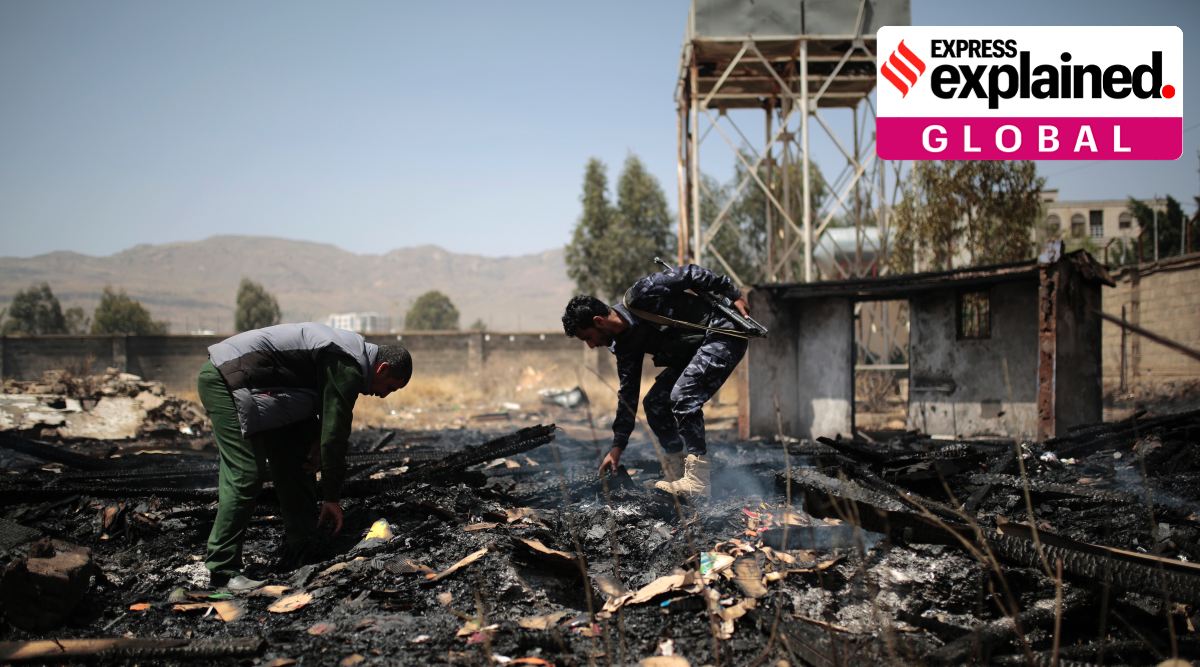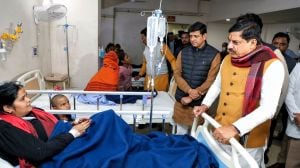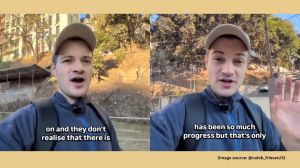Explained: Contours of Yemen’s first ceasefire in over 6 years
Since the war escalated in 2015, Yemen has suffered from one of the world's worst humanitarian crises, witnessing mass hunger, poverty and civilian deaths. The UN estimates over 377,000 deaths due to the conflict as of late 2021.
 Yemeni police inspect a site of Saudi-led airstrikes targeting two houses in Sanaa, Yemen, Saturday, March 26, 2022. (AP Photo/Hani Mohammed)
Yemeni police inspect a site of Saudi-led airstrikes targeting two houses in Sanaa, Yemen, Saturday, March 26, 2022. (AP Photo/Hani Mohammed)
The civil war in Yemen — between the Saudi-led coalition and the Iran-backed Houthi rebels — saw a historic two-month truce deal last week, the first of its kind since 2016. “The parties agreed to halt all offensive military, air, ground and maritime operations inside Yemen and across its borders,” UN special envoy Hans Grundberg said announcing the deal.
The anxiously awaited ceasefire agreement, brokered by the United Nations came into effect on April 2. The truce is the first nationwide cessation of hostilities agreed by all sides in over six years. The deal also coincided with the first day of Ramzan, the Muslim holy month of fasting.
Since the war escalated in 2015, Yemen has suffered from one of the world’s worst humanitarian crises, witnessing mass hunger, poverty and civilian deaths. The UN estimates over 377,000 deaths due to the conflict as of late 2021.
The war began in 2014 when Iran-backed Houthi rebels seized Sanaa and the country’s northwest, sending the ruling government into exile. Few months in, a military coalition led by Saudi Arabia intervened with a massive air campaign, hoping to drive back the Houthis and restore the government.
The UN, United States and Gulf nation diplomats have been trying to broker a peace deal in the war torn nation for years now. Several ceasefire agreements over the years have seen no impact on reducing the military action on the ground.
What is the new truce deal?
The two-month peace deal, announced at the peace talks hosted in Riyadh, calls for immediate halt of all ground, air and sea fighting from both sides. Saudi Arabia had hosted hundreds of Yemenis representing various political groups at the end of March in hope of brokering peace in the nation.
Under the deal, commercial flights will now be able to operate from the Houthi-held capital of Sanaa, fuel ships will be allowed to pass into the port of al-Hudaydah.
Roads into the besieged south-western city of Taiz would also be opened. More talks on reopening roads elsewhere to allow Yemenis the freedom to travel in the country are in the agreement.
The discussion on swapping prisoners on both sides is also on the table. The last major prisoner swap, involving nearly 1,000 detainees, took place in 2020 as part of confidence-building steps agreed at the last peace talks held in December 2018, news agency Reuters reported.
The time period of the peace deal can be extended with both parties’ consent.
According to US Special Envoy for Yemen Tim Lenderking, the deal is a culmination of stepped up and relatively aggressive US diplomacy along with the Houthis’ realisation that the war was resulting in no major dominant winner.
Lenderking also said this deal represented the first step for a permanent ceasefire. “If the international community and parties can work together, this could be built into a lasting ceasefire and inclusive political process that ultimately gives shape to a new Yemen,” Lenderking said in an interview to Reuters.
Why has the Yemen President stepped down?
Soon after the deal was announced, Yemen’s exiled President Abed Rabbo Mansour Hadi stepped down from his position and passed on power to a presidential council. The council will run the government and lead all conflict resolution efforts including talks with Houthi rebels in what he called the “transitional period” of the country.
“I irreversibly delegate to the Presidential Leadership Council my full powers in accordance with the constitution and the Gulf Initiative and its executive mechanism,” President Hadi announced in a statement this Thursday.
 Yemen’s President Abed Rabbo Mansour Hadi stepped aside and transferred his powers to a presidential council on Thursday, April 7, 2022. (AP Photo/Hussein Malla, File)
Yemen’s President Abed Rabbo Mansour Hadi stepped aside and transferred his powers to a presidential council on Thursday, April 7, 2022. (AP Photo/Hussein Malla, File)
The council would “negotiate with the Houthis to reach a ceasefire all over Yemen and sit at the negotiating table to reach a final political solution”, he added. It would be chaired by Abdullah al-Alimi Bawazeer, an advisor to the former president. The formation of the council was the most significant effort to reorganise the anti-Houthi forces in Yemen since the war began, the New York Times reported.
What do the Houthi-led rebels say about the deal?
The Houthi-led rebels refused to participate in peace talks hosted by Saudi Arabia, arguing that the venue should be a neutral country and not one of the adversaries of war. Despite this, Mohammed Abdel-Salam, the spokesman and chief negotiator of the Houthis welcomed the truce in a Twitter post. Mohammed Ali al-Houthi, a senior Houthi official, said the deal’s credibility will be its implementation.
How have foreign parties reacted?
UN Secretary-General Antonio Guterreshas welcomed the deal and urged all sides to implement the agreements as soon as possible. “You must take that momentum in order to make sure that this truce is fully respected and that it is renewed and … that a true political process is launched,” Guterres told reporters.
 “The ceasefire must be adhered to, and as I have said before, it is imperative that we end this war,” President Joe Biden said in a statement. Iran Foreign ministry spokesman Saeed Khatibzadeh reacted by saying that the country hopes this results in an improvement of the humanitarian situation and a full exchange of prisoners from both sides.
“The ceasefire must be adhered to, and as I have said before, it is imperative that we end this war,” President Joe Biden said in a statement. Iran Foreign ministry spokesman Saeed Khatibzadeh reacted by saying that the country hopes this results in an improvement of the humanitarian situation and a full exchange of prisoners from both sides.
What economic aid has flown in since the deal?
Since the formation of a council, Saudi Arabia and the United Arab Emirates have shown full support for it, welcoming the transition in the country. Along with this, the two countries have promised a new financial aid of $3 billion. Out of this, $2 billion will be injected into the Central Bank of Yemen, while the rest will be used for developmental projects. Saudi Arabia’s crown prince Mohammed bin Salman even met with the new presidential council’s members.
What is India’s stance on the deal?
India has welcomed the truce deal and expressed hope that it will help in building a positive momentum towards an inclusive political process to end the civil war in Yemen. “We welcome the announcement of the two-month ceasefire in the Yemen conflict from April 2 at the initiative of UNSG’s Special Envoy Hans Grundberg,” External Affairs Ministry spokesperson Arindam Bagchi said at a media briefing. Bagchi said India has historical and friendly ties with Yemen and hopes for peace, security and prosperity for the people of the country as well as the region.
Newsletter | Click to get the day’s best explainers in your inbox
- 01
- 02
- 03
- 04
- 05





































